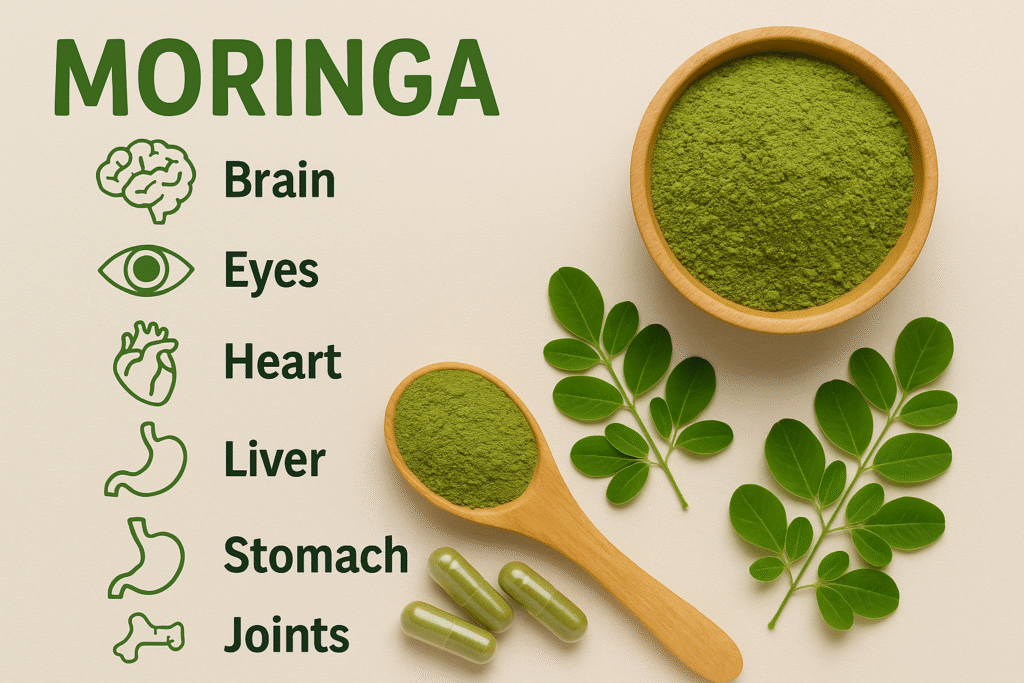Moringa, often hailed as the “miracle tree” or “tree of life,” is a nutrient-dense plant that has been used for centuries in traditional medicine and culinary practices. Scientifically known as Moringa oleifera, this fast-growing, drought-resistant tree is native to the Indian subcontinent but is now cultivated in tropical and subtropical regions worldwide. Its leaves, seeds, pods, roots, and flowers are all edible and packed with vitamins, minerals, antioxidants, and bioactive compounds, making it a true superfood.

From boosting immunity to supporting heart health, moringa’s versatility and nutritional profile have made it a staple in health-conscious diets. This SEO-optimized, comprehensive guide explores the health benefits of moringa, how to incorporate it into your daily routine, who can safely use it, and answers to frequently asked questions about this remarkable plant.
Health Benefits of Moringa:
Moringa is often celebrated for its wide array of health benefits, supported by both traditional use and modern scientific research. Below, we dive into the key advantages of incorporating moringa into your diet.
1. Rich in Nutrients
Moringa leaves are a nutritional powerhouse, containing a variety of essential vitamins and minerals. A single serving of moringa leaf powder provides:
- Vitamin A: Supports vision, skin health, and immune function.
- Vitamin C: Boosts immunity and acts as an antioxidant.
- Calcium: Essential for bone health and muscle function.
- Iron: Crucial for oxygen transport and preventing anemia.
- Protein: Contains all nine essential amino acids, making it a complete plant-based protein.
For example, gram for gram, moringa leaves contain seven times more vitamin C than oranges, four times more calcium than milk, and three times more iron than spinach.
2. Potent Antioxidant Properties
Moringa is loaded with antioxidants like quercetin, chlorogenic acid, and beta-carotene, which combat oxidative stress and reduce inflammation. These compounds neutralize free radicals, protecting cells from damage that can lead to chronic diseases such as cancer, diabetes, and heart disease. Studies have shown that moringa’s antioxidant capacity may rival that of well-known superfoods like green tea.
3. Supports Heart Health
Moringa may help lower cholesterol levels and blood pressure, reducing the risk of cardiovascular diseases. Its anti-inflammatory and antioxidant properties protect the heart by preventing plaque buildup in arteries. Additionally, moringa contains compounds like isothiocyanates, which have been shown to regulate blood sugar and lipid levels, further supporting heart health.
4. Enhances Immune Function
The high vitamin C and A content in moringa strengthens the immune system, helping the body fight infections and illnesses. Its antimicrobial and antibacterial properties may also inhibit the growth of pathogens, making it a natural ally for maintaining overall health.
5. Aids in Blood Sugar Regulation
Moringa has shown promise in managing blood sugar levels, which is particularly beneficial for individuals with diabetes or prediabetes. Compounds like isothiocyanates and chlorogenic acid help improve insulin sensitivity and reduce glucose spikes after meals. A 2014 study found that moringa leaf powder significantly lowered fasting blood sugar levels in diabetic patients.
6. Promotes Digestive Health
Moringa’s high fiber content supports healthy digestion by promoting regular bowel movements and preventing constipation. Its anti-inflammatory properties may also soothe digestive issues like bloating and irritable bowel syndrome (IBS). Additionally, moringa’s antimicrobial effects can help balance gut bacteria, fostering a healthy microbiome.
7. Supports Skin and Hair Health
Moringa’s rich vitamin E and antioxidant content make it a popular ingredient in skincare products. It protects the skin from environmental damage, reduces signs of aging, and promotes collagen production. Moringa oil, derived from its seeds, is a natural moisturizer that nourishes the skin and strengthens hair follicles, reducing hair loss and promoting growth.
8. Boosts Energy and Reduces Fatigue
Moringa’s iron and magnesium content helps combat fatigue and improve energy levels. Its amino acids support muscle repair and recovery, making it a favorite among athletes and fitness enthusiasts. Unlike caffeine, moringa provides sustained energy without the jitters or crashes.
9. Anti-Inflammatory Benefits
Chronic inflammation is linked to numerous health conditions, including arthritis, heart disease, and cancer. Moringa’s isothiocyanates and flavonoids have potent anti-inflammatory effects, reducing inflammation markers in the body. This makes it a valuable addition for individuals managing inflammatory conditions.
10. Supports Weight Management
Moringa’s low-calorie, nutrient-dense profile makes it an excellent addition to weight loss diets. Its fiber content promotes satiety, reducing cravings and overeating. Additionally, moringa’s ability to regulate blood sugar and metabolism may support healthy weight management.

How to Use Moringa?
Moringa’s versatility makes it easy to incorporate into your daily routine. It is available in various forms, including fresh leaves, dried leaves, powder, capsules, tea, and oil. Here are some practical ways to use moringa:
1. Moringa Powder
Moringa leaf powder is the most common form and can be added to:
- Smoothies: Blend 1–2 teaspoons of moringa powder with fruits, vegetables, and a liquid base like almond milk for a nutrient-packed smoothie.
- Juices: Stir moringa powder into fresh juices for an extra health boost.
- Soups and Stews: Sprinkle moringa powder into soups, stews, or sauces for added nutrition without altering the flavor significantly.
- Baked Goods: Incorporate moringa powder into muffins, bread, or energy bars for a healthy twist.
Tip: Start with a small amount (1/2 teaspoon) to assess taste and tolerance, gradually increasing to 1–2 teaspoons daily.
2. Moringa Tea
Moringa tea, made from dried leaves, is a soothing way to enjoy its benefits. Steep 1 teaspoon of moringa leaves or powder in hot water for 5–10 minutes. Add honey or lemon for flavor, and enjoy it as a morning or evening beverage.
3. Moringa Capsules
For those who prefer convenience, moringa capsules or tablets are widely available. Follow the dosage instructions on the packaging, typically 1–2 capsules daily with meals.
4. Fresh Moringa Leaves
If you have access to fresh moringa leaves, they can be used like spinach or kale:
- Salads: Toss fresh moringa leaves into salads for a nutrient boost.
- Stir-Fries: Sauté moringa leaves with garlic, onions, and your favorite vegetables.
- Soups: Add fresh leaves to soups or curries during the last few minutes of cooking to preserve their nutrients.
5. Moringa Oil
Moringa seed oil is excellent for skin and hair care:
- Skincare: Apply a few drops of moringa oil to your face as a moisturizer or to reduce acne and blemishes.
- Haircare: Massage moringa oil into your scalp to nourish hair follicles and reduce dandruff.
6. Moringa Pods
Young moringa pods, also known as drumsticks, are commonly used in South Asian cuisine. They can be boiled, steamed, or added to curries and soups for a mild, asparagus-like flavor.
Storage Tip: Store moringa powder in an airtight container in a cool, dark place to preserve its potency. Fresh leaves should be refrigerated and used within a few days.
Who Can Use Moringa?
Moringa is generally safe for most people when consumed in moderation. It is suitable for:
- Adults: Healthy adults can incorporate moringa into their diets to boost overall nutrition, energy, and immunity.
- Vegetarians and Vegans: Moringa’s complete protein profile makes it an excellent plant-based protein source.
- Athletes: Its amino acids and energy-boosting properties support muscle recovery and performance.
- Individuals with Nutritional Deficiencies: Moringa’s high vitamin and mineral content can help address deficiencies in iron, calcium, or vitamin A.
- People Managing Chronic Conditions: Those with diabetes, high cholesterol, or inflammatory conditions may benefit from moringa’s regulatory effects, but they should consult a healthcare provider first.
Who Should Avoid or Limit Moringa?
While moringa is safe for most, certain groups should exercise caution:
- Pregnant or Breastfeeding Women: Moringa leaves are generally safe, but high doses or certain parts (like roots or seeds) may have uterine-stimulating effects. Consult a doctor before use.
- Individuals on Medications: Moringa may interact with medications for diabetes, blood pressure, or thyroid conditions due to its effects on blood sugar and thyroid function.
- People with Allergies: Some individuals may be allergic to moringa. Start with a small dose to test for adverse reactions.
- Those with Low Blood Pressure: Moringa’s blood pressure-lowering effects may cause dizziness in individuals with already low blood pressure.
Always consult a healthcare professional before adding moringa to your routine, especially if you have pre-existing health conditions or are taking medications.
Frequently Asked Questions (FAQs) About Moringa
1. What is moringa, and why is it called a superfood?
Moringa is a nutrient-rich plant known as Moringa oleifera, celebrated for its high levels of vitamins, minerals, antioxidants, and amino acids. It’s called a superfood because of its dense nutritional profile and numerous health benefits, including boosting immunity, reducing inflammation, and supporting heart health.
2. How much moringa should I take daily?
For most adults, 1–2 teaspoons (4–6 grams) of moringa powder daily is considered safe and effective. Start with a smaller dose (1/2 teaspoon) to assess tolerance, and consult a healthcare provider for personalized advice.
3. Can moringa help with weight loss?
Yes, moringa may support weight loss by promoting satiety, regulating blood sugar, and boosting metabolism due to its fiber, protein, and antioxidant content. However, it’s not a magic solution and should be paired with a balanced diet and exercise.
4. Is moringa safe for children?
Moringa is generally safe for children in small amounts, such as in food or smoothies, but the dosage should be adjusted based on age and weight. Consult a pediatrician before giving moringa supplements to children.
5. Can moringa cure diseases like diabetes or cancer?
While moringa has shown promise in managing blood sugar and reducing inflammation, it is not a cure for diseases like diabetes or cancer. It can complement medical treatment but should not replace prescribed therapies. Always consult a doctor for serious conditions.
6. Does moringa have any side effects?
Moringa is safe for most people when consumed in moderation. Possible side effects include digestive upset, diarrhea, or allergic reactions in rare cases. High doses may lower blood pressure or blood sugar excessively, so monitor your intake.
7. Can I grow moringa at home?
Yes, moringa is easy to grow in warm climates or as a potted plant in cooler regions. It thrives in well-drained soil and full sunlight. Seeds or cuttings can be used to propagate the plant, and it grows quickly under optimal conditions.
8. How does moringa compare to other superfoods like spirulina or kale?
Moringa, spirulina, and kale are all nutrient-dense, but moringa stands out for its complete protein profile and higher levels of certain nutrients like vitamin C and calcium. Spirulina is richer in omega-3s, while kale is lower in calories. Your choice depends on your dietary needs.
9. Can moringa improve skin and hair health?
Yes, moringa’s antioxidants, vitamin E, and anti-inflammatory compounds promote healthy skin by reducing acne and signs of aging. Moringa oil strengthens hair follicles and reduces dandruff, making it a popular choice for natural beauty routines.
10. Where can I buy high-quality moringa products?
Moringa products are available at health food stores, online retailers, and pharmacies. Look for organic, non-GMO moringa powder, capsules, or oil from reputable brands. Check for third-party testing to ensure purity and quality.
Conclusion:
Moringa is a versatile, nutrient-packed superfood with a wide range of health benefits, from boosting immunity and supporting heart health to promoting radiant skin and hair. Its ease of use in powders, teas, capsules, and fresh forms makes it accessible to everyone, from health enthusiasts to those addressing specific nutritional needs. While generally safe, moderation and consultation with a healthcare provider are key, especially for pregnant women or those on medications.
By incorporating moringa into your diet or skincare routine, you can harness the power of this “miracle tree” to enhance your overall well-being. Whether you’re sipping moringa tea, blending it into smoothies, or using its oil for glowing skin, this superfood is a valuable addition to a healthy lifestyle.

